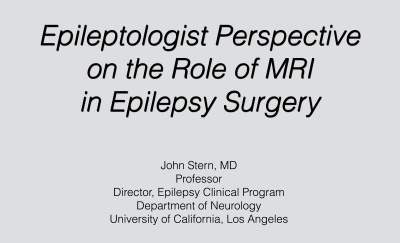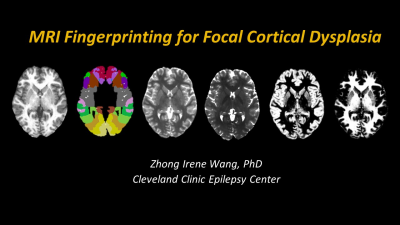Weekday Course
Role of MRI in Epilepsy Surgery & Neuromodulation
ISMRM & ISMRT Annual Meeting & Exhibition • 03-08 June 2023 • Toronto, ON, Canada

| 08:00 |
 |
Epileptologist Perspective on the Role of MRI in Epilepsy
Surgery
John Stern
Keywords: Neuro: Brain Epilepsy is a common and potentially disabling neurologic disorder due to neuronal dysfunction. Fortunately, surgical treatment can provide seizure freedom when anti-seizure medications fail, but identifying appropriate patients and optimizing surgical treatments requires localizing epileptic abnormality that often is varying and may occur without evident structural abnormality. However, MRI has considerable diagnostic and prognostic value for epilepsy surgery, as it may provide a potential structural correlate to a plausible epileptic localization. Improving the evaluation of epilepsy will require better integration of high resolution structural imaging with high specificity functional imaging. With this, many additional patients will receive more effective treatments. |
| 08:25 | Finding Focal Cortical Dysplasia Using High-Resolution MRI Simon Warfield | |
| 08:50 |
Finding Focal Cortical Dysplasia Using Diffusion MRI
David Carmichael
Keywords: Neuro: Brain, Contrast mechanisms: Diffusion Focal Cortical Dysplasia is characterised by abnormalities in cortical lamination, myelination, cell types and sizes in addition to white matter abnormalities. These tissue characteristics of interest lend themselves to investigation with diffusion MRI, that attempts to access differences in water mobility within the tissue environment. Initial studies used FA and MD and showed sensitivity to focal abnormalities but were limited by a lack of specificity. More recently, the availability of multi-shell diffusion data and more advanced models have led to specificity improvements. Ongoing technical developments and validation can make advanced diffusion MRI an important tool for FCD identification and characterisation. |
|
| 09:15 |
 |
MRI Fingerprinting for Focal Cortical Dysplasia
Irene Wang
Keywords: Image acquisition: MR Fingerprinting Magnetic resonance fingerprinting (MRF) is a novel quantitative MRI technique that enables the acquisition of multiparametric tissue property maps with high efficiency. In this talk, we will review principles of MRF and its advantages for imaging focal cortical dysplasia (FCD), in the context of epilepsy presurgical evaluation. We will discuss applications of MRF on FCD detection and its additional value to conventional MRI approaches. We will also discuss the role of MRF to provide in vivo subtype characterization of FCD. The talk will conclude with future direction on using the flexible framework of MRF for better depiction of FCD. |
| 09:40 |
Break & Meet the Teachers |
|
| 10:05 |
Epilepsy Surgery Planning Using Functional MRI
Christopher Benjamin
Keywords: Neuro: Brain, Neuro: Brain function In this educational session an overview of the evidence supporting clinical fMRI's use as well as the knowledge and skills it requires will be provided. |
|
| 10:30 |
Diffusion MRI & Tractography for Epilepsy Surgery
Chantal Tax
Keywords: Contrast mechanisms: Diffusion, Neuro: White matter, Neuro: Brain connectivity Diffusion MRI tractography is a non-invasive neuroimaging technique used to study the brain's white matter connections. In epilepsy, it has for example been used to identify and visualize abnormal white matter tracts and to plan surgical interventions. This talk will highlight methodological aspects of the technique, applications, and potential pitfalls related to its reliability and validity for use in clinical practice. |
|
| 10:55 |
Neuromodulation to Treat Epilepsy
Axel Thielscher
Keywords: Neuro: Brain, Neuro: Brain Plasticity A number of different brain stimulation methods are currently tested as adjunct therapies for drug-refractory epilepsy. This talk will start by giving an overview of the relevant invasive and noninvasive electric stimulation approaches. It will discuss the mechanisms of action by which the stimulation approaches are thought to alter cortical activity, and briefly summarize the data on their clinical efficacy and safety. Finally, current methodological advances to personalize the interventions based on structural and functional MRI data as well as calculations of the induced electric field distributions will be highlighted. |
|
| 11:20 |
Advances in Transcranial Magnetic Stimulation
Mark Eldaief
|
The International Society for Magnetic Resonance in Medicine is accredited by the Accreditation Council for Continuing Medical Education to provide continuing medical education for physicians.